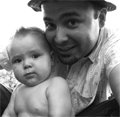The batteries we would buy in Kiribati worked, so that wasn't necessarily the root of my lighting problem, but the lifespan of said batteries was a definite issue. Their operational efficiency depended HEAVILY on the device being used. A Kasio [sic] keyboard, for instance, blasted at full volume by a neighbor practicing for an Independence Day botaki might need to be changed out every two songs or so, unless, of course, the neighbor is practicing at 3:00am...then the batteries had uncanny staying power. There was also the case of the "inconvenient crap-out" where a low-wattage item would die when most needed, say, during an aforementioned stroll down a rock cluttered dirt road...barefoot...three miles from your home...during the rainy season.
Batteries are, and will continue to be, a MAJOR issue in developing nations as more and more technology and goods continue to be introduced without a proper means to maintain and dispose of them after life has ended. So you can imagine my elation when I stumbled upon this website (while the technology is by no means new, continue reading to see why Freeplay is nevertheless a modernistic company):
 Freeplay Energy is a damn cool website devoted to all products "crank." From weather band radios to eye-blinding LED flashlights, freeplay has it all.
Freeplay Energy is a damn cool website devoted to all products "crank." From weather band radios to eye-blinding LED flashlights, freeplay has it all.From their site:
At Freeplay Energy, we believe in developing environmentally-responsible products to empower the global village. As the original creators of the famous wind up radio, we now develop and manufacture a wide range of electronic products distributed throughout the world. Freeplay’s award winning self-sufficient products harness human, solar, and rechargeable energy to power durable portable devices from radios to lanterns to mobile phone chargers. Forget disposable batteries. Our self-sustainable power solutions provide energy for life, while respecting the social and environmental impact on our planet. You can rely on Freeplay Energy products to work anytime and anywhere.
Freeplay Energy’s commitment to the planet goes well beyond the environment. Our products are engineered with every nation in mind. In developing countries – which have little or no access to reliable energy – we are pioneering, durable, innovative, rechargeable products that withstand the harshest climate and use. Our products offer convenience and security to some, and to others, enable critical communication, access to education and basic lighting at night to improve their quality of life.
 What's more is that they provide a great product AND a great message. Established in 1998, the Freeplay Foundation "is committed to providing innovative and practical energy solutions and to ensuring sustained access to information and education via radio." More from their site:
What's more is that they provide a great product AND a great message. Established in 1998, the Freeplay Foundation "is committed to providing innovative and practical energy solutions and to ensuring sustained access to information and education via radio." More from their site:The Freeplay Foundation aims to:
-facilitate sustained access to information and education for the poorest of the poor, especially children, women, refugees and the disabled.
-raise awareness of the role of radio broadcasting and communication in developing countries, disaster areas and regions of conflict.
-research opportunities where appropriate and alternative sources of energy can be applied to improve the lives of people in developing communities, especially children living on their own.
-seek sponsorship to initiate and support humanitarian communication initiatives.
 My time on the islands might be over, but I might still buy crankable flashlight...not because I need it, but because this company actually "gets it."
My time on the islands might be over, but I might still buy crankable flashlight...not because I need it, but because this company actually "gets it."The Sustainable Times also has a really wonderful article.

